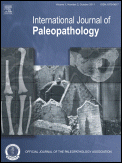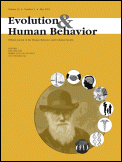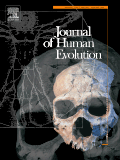
Anthropologie-International Journal of Human Diversity and Evolution
metrics 2024
Advancing Knowledge in Evolutionary Anthropology
Introduction
Anthropologie-International Journal of Human Diversity and Evolution is a prominent peer-reviewed journal published by the esteemed MORAVIAN MUSEUM in the heart of the Czech Republic. With a focus on anthropology, this journal serves as a vital platform for the dissemination of innovative research that explores human diversity and evolutionary studies. The journal operates under a rigorous academic framework and is categorized in the Q3 quartile for anthropology in 2023, reflecting its significance in the field. Although it does not currently offer open access options, Anthropologie facilitates the exchange of knowledge through its carefully curated articles spanning diverse topics within human evolution. Its Scopus ranking (320 out of 502 in social sciences) underscores its role as a relevant source for scholars and professionals alike, fostering dialogue and advancements in understanding human diversity. Researchers, students, and practitioners can look forward to engaging content that not only enlightens but also inspires further inquiry into anthropological studies.
Metrics 2024
 0.18
0.18 0.20
0.20 0.30
0.30 10
10Metrics History
Rank 2024
Scopus
IF (Web Of Science)
JCI (Web Of Science)
Quartile History
Similar Journals

Antropologia Portuguesa
Innovating Research on Human BehaviorAntropologia Portuguesa, published by COIMBRA UNIV PRESS, is a distinguished open access journal in the field of anthropology, with an ISSN of 0870-0990 and an E-ISSN of 2182-7982. Based out of Coimbra, Portugal, this journal has been a vital resource for researchers and enthusiasts in the anthropological community since transitioning to an open access model in 2012, allowing for broader dissemination and accessibility of knowledge. With its diversified publications spanning from 2011 to 2023, it is well-established within the academic landscape, achieving a Q3 category rank in anthropology as of 2023, and holding a Scopus ranking of #376 out of 502 in the Social Sciences category, placing it within the 25th percentile. The journal aims to foster interdisciplinary dialogue and promote innovative research, offering a platform for the exploration of various anthropological themes and practices. As it continues to contribute to the scholarship in anthropology, Antropologia Portuguesa is an invaluable resource for researchers, professionals, and students committed to understanding cultural dynamics and human behavior on a global scale.

International Journal of Paleopathology
Charting the Path of Health and Disease in HistoryThe International Journal of Paleopathology, published by Elsevier Science Inc, serves as a leading scholarly platform dedicated to the study of ancient diseases and their effects on human populations throughout history. Since its inception in 2011, this journal has garnered a prestigious reputation in the field, earning a 2023 Q1 ranking in Archeology and a Q2 ranking in Pathology and Forensic Medicine, attesting to its rigorous peer-review process and high-quality research output. With an impressive Scopus ranking of 38th out of 413 in Archeology and 98th out of 208 in Pathology and Forensic Medicine, the journal is positioned within the top percentile of its categories, reflecting its significant contribution to the advancement of knowledge in these disciplines. While the journal is not open access, it offers invaluable insights into the interactions of health, disease, and societal changes over time, making it an essential resource for researchers, professionals, and students looking to explore the intricate connections between past populations and their health.

Time & Mind-The Journal of Archaeology Consciousness and Culture
Decoding Cultural Practices Through TimeTime & Mind - The Journal of Archaeology Consciousness and Culture, published by Routledge Journals, Taylor & Francis Ltd, stands at the intersection of archaeology and consciousness studies, revealing the intricate relationship between cultural practices and human cognition. With a robust ISSN of 1751-696X and an E-ISSN of 1751-6978, this esteemed journal plays a vital role in fostering interdisciplinary dialogue among scholars in the realms of anthropology and archaeology. Notably recognized for its rigorous academic standards, it achieved a commendable Q2 category ranking across various fields in 2023, including Anthropology and Archeology, alongside impressive Scopus rankings. As it continues to publish cutting-edge research from 2008 to 2024, this journal remains dedicated to exploring the nuances of human experience through the lens of archaeological evidence, making it an indispensable resource for researchers, professionals, and students alike seeking to deepen their understanding of the cultural dimensions of consciousness.

Annual Review of Anthropology
Pioneering Perspectives in AnthropologyAnnual Review of Anthropology is a premier journal published by Annual Reviews, dedicated to providing comprehensive and authoritative reviews in the field of anthropology. Established with the goal of synthesizing essential research findings, this influential publication not only shapes contemporary anthropological discourse but also facilitates interdisciplinary dialogue within the broader realm of social sciences and cultural studies. With an impressive impact factor that places it in the Q1 category across multiple classifications, including Anthropology and Arts and Humanities, this journal is highly regarded by researchers and academics alike. The Annual Review of Anthropology has been a trusted resource for critical insights and transformative ideas, helping to advance the understanding of human societies from 1980 to the present. Although it does not offer open access, access to its articles is available through various academic institutions, ensuring that both seasoned scholars and students can benefit from its wealth of knowledge. With a Scopus ranking placing it in the top percentiles for relevant subjects, this journal is essential reading for anyone looking to stay at the forefront of anthropological research.

Intersecciones en Antropologia
Advancing anthropological dialogue across borders.Intersecciones en Antropologia, published by the Universidad Nacional del Centro de la Provincia de Buenos Aires (UNICEN), Facultad de Ciencias Sociales, is a premier open-access journal in the field of anthropology, having established its presence since 2010. With an impressive impact factor and currently holding the distinguished Q1 quartile ranking in anthropology for 2023, this journal has quickly become a vital resource for scholars and practitioners alike, offering a platform for innovative research and critical discussion. The journal aims to advance anthropological scholarship by encouraging the dissemination of diverse perspectives and stimulating dialogue across geographical and cultural boundaries. Its open-access model, adopted in 2017, ensures that valuable research findings are accessible to a global audience, fostering collaboration and engagement within the academic community and beyond. Located in the vibrant cultural context of Argentina, Intersecciones en Antropologia serves as a conduit for significant anthropological dialogues, making it an essential read for those dedicated to understanding and contributing to the evolving landscape of social sciences.

Ethnoarchaeology
Bridging Cultures: Unraveling the Past Through Contemporary PracticesEthnoarchaeology, published by ROUTLEDGE JOURNALS, TAYLOR & FRANCIS LTD, stands at the forefront of interdisciplinary research within the realms of anthropology and archaeology. With an ISSN of 1944-2904 and an E-ISSN of 1944-2890, this journal has demonstrated an impressive impact, categorized in the Q1 quartile for both anthropology and archaeology as of 2023. Acknowledged for its influence, it ranks 72/413 in Archeology (arts and humanities) with an impressive 82nd percentile, making it a vital resource for researchers and practitioners. Over its converged years from 2014 to 2024, the journal aims to bridge theoretical and practical aspects of ethnoarchaeology, fostering a deeper understanding of cultural practices through archaeological perspectives. Its commitment to advancing knowledge in this unique field is of utmost importance for academics, professionals, and students dedicated to exploring the interplay between contemporary societies and historical archaeological practices.

EVOLUTION AND HUMAN BEHAVIOR
Bridging Disciplines to Decode Human Behavior EvolutionEVOLUTION AND HUMAN BEHAVIOR, published by Elsevier Science Inc, is a leading interdisciplinary journal that explores the intricate relationships between evolutionary processes, human behavior, and cognition. With an impressive impact factor reflecting its rigorous peer-reviewed content and high citation rates, this journal falls in the prestigious Q1 quartile across multiple categories including Arts and Humanities, Ecology, Evolution, Behavior and Systematics, and Experimental and Cognitive Psychology, solidifying its critical role in advancing research in these fields. Since its inception in 1997 and moving towards 2024, it has consistently provided a platform for innovative research and insights, attracting contributions from a diverse range of disciplines. The journal is accessible through various open access options, ensuring that groundbreaking research is widely disseminated for maximum impact. Researchers, professionals, and students alike benefit from the cutting-edge studies published within, making EVOLUTION AND HUMAN BEHAVIOR an essential resource for those looking to deepen their understanding of the evolutionary context of human actions and interactions.

JOURNAL OF HUMAN EVOLUTION
Pioneering Research in Anthropology and EvolutionThe JOURNAL OF HUMAN EVOLUTION, published by ACADEMIC PRESS LTD - ELSEVIER SCIENCE LTD, is a premier academic journal focusing on the evolutionary biology of humans and their ancestors. With an esteemed Q1 ranking in the fields of Anthropology and Ecology, Evolution, Behavior and Systematics, this journal is a vital resource for researchers, professionals, and students dedicated to understanding human origins and evolutionary processes. The journal has been steadfastly contributing to the field since 1972, converging knowledge and insights through meticulously peer-reviewed articles. Additionally, it holds an impressive Scopus rank of #12/502 in Anthropology and #105/721 in Ecology, underlining its significant impact and prestige within the academic community. While the journal is not open access, its content remains accessible to those within institutional affiliations, fostering an environment rich in scholarly exchange and innovation. By disseminating cutting-edge research and comprehensive reviews, the JOURNAL OF HUMAN EVOLUTION continues to illuminate the complex narrative of human evolution and is essential reading for anyone engaged in this dynamic field.

Archaeological and Anthropological Sciences
Innovative Research, Timeless DiscoveriesArchaeological and Anthropological Sciences is an esteemed peer-reviewed journal published by Springer Heidelberg, specializing in the interdisciplinary fields of archaeology and anthropology. Since its inception in 2009, this journal has established itself as a pivotal resource for researchers and professionals, featuring cutting-edge studies that bridge the gap between the sciences and humanities. With its impressive 2023 Q1 rankings in Anthropology and Archaeology categories, the journal stands out in the Scopus landscape, ranking within the top 5% of its field—Rank #18/413 in Archaeology (Arts and Humanities) and Rank #28/502 in Anthropology. This is complemented by its commitment to disseminating high-quality research to a global audience, despite being a non-Open Access publication. The journal's scope encompasses innovative methodologies, archaeological findings, and anthropological insights that are vital for advancing knowledge and fostering academic discourse. As it moves toward its upcoming converged years, Archaeological and Anthropological Sciences continues to solidify its reputation as a key forum for scholarly exchange in these fields.

HOMO-JOURNAL OF COMPARATIVE HUMAN BIOLOGY
Fostering Innovation in Comparative StudiesHOMO - Journal of Comparative Human Biology is a prestigious academic journal dedicated to advancing the field of comparative human biology, offering a platform for researchers, professionals, and students to disseminate cutting-edge findings. Published by E Schweizerbart'sche Verlagsbuchhandlung in Germany, this journal has been a crucial resource since its inception in 1950, featuring a rich archive of studies until 2023. It holds a Q3 quartile ranking in Anthropology and a Q4 quartile ranking in Miscellaneous Medicine, reflecting its significance and influence within the academic community. Although not an Open Access journal, it provides a wealth of robust research that intersects with various disciplines within the anthropological sciences. Researchers looking for a wide array of comparative studies and insights into human biology will find HOMO an invaluable addition to their scholarly resources.